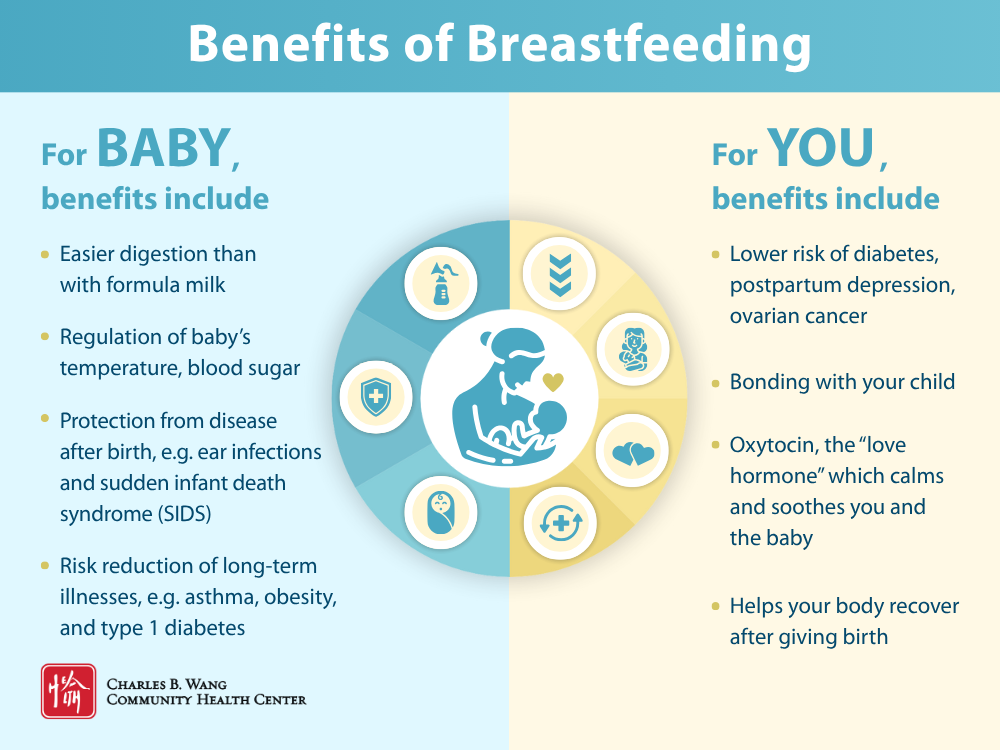Breastfeeding Tips - Common Challenges & Solutions
By Joy Nieh, MA
Reviewed by Yajie Zhu, EdD, MA

Breastfeeding is a special experience that you share with your baby. It helps you bond with your baby and helps make sure the baby is healthy.1
But, like learning how to drive, no one wakes up one morning knowing how to do it. Breastfeeding takes time and practice. Even after making the decision to breastfeed, there may be times when breastfeeding can feel daunting or challenging. Give yourself grace when things don't go exactly as you envisioned. Rest assured knowing you are not only helping yourself by breastfeeding, but also giving your child the best start for the rest of their life.
Benefits of Breastfeeding For You and Baby
For BABY, benefits include:
- Easier digestion than with formula milk
- Regulation of baby’s temperature, blood sugar
- Protection from disease after birth, e.g. ear infections and sudden infant death syndrome (SIDS)
- Risk reduction of long-term illnesses, e.g. asthma, obesity, and type 1 diabetes2
For YOU, benefits include:
- Lowered risk of diabetes, postpartum depression, and ovarian cancer
- Bonding with your child
- Release of oxytocin, the “love hormone” which calms and soothes you and the baby
- Helping your body recover after giving birth
- Saving money on feeding supplies (up to $1,500 in the first year alone)

Common Breastfeeding Challenges & How to Overcome Them
Especially in the beginning, breastfeeding can be challenging and overwhelming. Obstetrics & Gynecology providers, lactation consultants, and family can all be great resources during your breastfeeding journey. Below are some common breastfeeding challenges a parent might face and some suggestions for breastfeeding at home.
Sore Nipples
At first, nipples can feel tender when you first start breastfeeding. After you have found positions that work well for you and your baby, breastfeeding should be comfortable, especially if the baby latches well.1
Suggestions:
- Try changing positions every time you breastfeed, to distribute the pressure.1
- If your baby is only sucking on the nipple, place a clean finger in the corner of your baby’s mouth to release the suction and try to latch again.1
- After feeding, express a few drops of milk and gently rub on your nipples with clean hands. Breast milk has natural healing properties that can soothe your nipples. Let your nipples air dry after feeding.1
- Avoid wearing bras or tight fitting clothes that put pressure on your nipples.1
- Avoid using soap or any ointments with chemicals on your nipples. Clean water is all you need to keep your breasts and nipples clean.1
Low Milk Supply
Nursing parents can be concerned about whether they have enough milk to feed their baby adequately. The best way to know that your baby is getting enough milk is to monitor your baby’s weight and growth. This is something you can discuss with your child’s pediatrician during well child visits.3
Suggestions:
- Make sure the baby has a good latch and is in a good position to breastfeed.1
- Breastfeed often, and let the baby decide when the feeding is done.1 Your baby will let go or fall asleep when they are done feeding.
- Having your child breastfeed immediately after they are born helps the body initiate milk supply and maintain milk production. Mothers who start breastfeeding early have an easier time continuing to breastfeed.4,5
- Limit or avoid supplementing with baby formula since this may generate less interest in breast milk and decrease your own milk supply.1
Engorgement
When the breasts feel very hard and painful, this may be a sign of engorgement.1 Engorgement happens when the milk builds up in the breasts.1 With the right preventative measures, engorgement will resolve naturally.1
Suggestions:
- After birth, breastfeed often and let the baby feed as long as they like, as long as they have a good latch and are sucking well. If 4 hours have passed since the last feeding, make sure to wake and feed your baby [1].
- Work together with a lactation consultant for best positions and how to improve the baby’s latch.
If you are continuously experiencing pain during breastfeeding or are concerned at any point about whether the breastfeeding is going well, reach out to a lactation consultant or your OBGYN, who can help you with your breastfeeding questions and needs. You are not alone in this journey, and CBWCHC has a dedicated care team to help you navigate your options.
Tips for Long-Term Success
Do not be discouraged if the first feedings are challenging or difficult. This is new, both for you and your baby, and it will get easier with practice. If you are facing any difficulties or if there is continuous pain while breastfeeding, reach out to a lactation consultant or your OBGYN for help.
Remember that you are taking steps to support your baby’s health and development. It is recommended that babies exclusively breastfeed for their first 6 months and then continue breastfeeding for up to 2 years, so try to limit or avoid supplementing with formula.4,5 But breastfeeding is not an all-or-nothing decision, and every time you choose to breastfeed is an opportunity for health benefits for your baby and family.
It is important to take care of your mental health as well. Giving birth, breastfeeding, and caring for a newborn are stressful experiences. Take steps to care for your mental well-being as well as your physical health. Caring for yourself might include:
- Sleeping: try to get at least 7-9 hours of sleep every night. This helps not only your physical but also mental health.
- Exercising: consult a doctor about when is a good time to start exercising after giving birth. Exercise releases endorphins, which help relieve stress and improve your mood.
- Relaxing or enjoying your hobbies: what activities do you like to do that help you unwind? Make space for things that make you happy and alone time to relax when you need it.
- Seeing a therapist if needed: Talking with a therapist or counselor can be helpful to process and talk through any of these challenges you may be facing.
Ask for help. Reach out to your support system, including friends, family, or your partner, for help. You don’t have to take care of your baby on your own. There are also Breastfeeding Support groups such as the La Leche League you can also turn to for support.8
Talking to a Health Care Provider
Charles B. Wang Community Health Center also offers support for lactating parents through our experienced health care providers and certified lactation consultants. Our staff provide high-quality care for our patients throughout all stages of life, including their postpartum and breastfeeding journey. Our multilingual lactation consultants, OBGYN, and Internal Medicine staff provide health care that respects your cultural background and fosters your physical and emotional health.
- Schedule an appointment with an Obstetrics & Gynecology Provider.
- Schedule an appointment with an Internal Medicine Provider.
- Schedule an appointment with a Pediatrics Provider.
- If you're preparing for breastfeeding and receiving prenatal care at the Health Center, speak with our prenatal care team at 718-886-1287 (Queens) or 212-966-0228 (Manhattan).
Sources
- https://womenshealth.gov/breastfeeding/breastfeeding-resources
- https://www.cdc.gov/breastfeeding/features/breastfeeding-benefits.html
- https://www.healthychildren.org/English/ages-stages/baby/breastfeeding/Pages/How-to-Tell-if-Baby-is-Getting-Enough-Milk.aspx
- https://www.medela.com/en/breastfeeding-pumping/articles/pregnancy-preparation/breastfeeding-your-newborn-what-to-expect-in-the-first-week
- https://llli.org/breastfeeding-info/frequency-feeding-frequently-asked-questions-faqs/
- https://www.who.int/health-topics/breastfeeding
- https://www.healthychildren.org/English/ages-stages/baby/breastfeeding
- https://lllny.org/find-a-leader/
Heading
Lorem ipsum dolor sit amet, consectetur adipiscing elit. Suspendisse varius enim in eros elementum tristique. Duis cursus, mi quis viverra ornare, eros dolor interdum nulla, ut commodo diam libero vitae erat.


Heading
Lorem ipsum dolor sit amet, consectetur adipiscing elit. Suspendisse varius enim in eros elementum tristique. Duis cursus, mi quis viverra ornare, eros dolor interdum nulla, ut commodo diam libero vitae erat.
The Charles B. Wang Community Health Center is a nonprofit and federally qualified health center offering comprehensive primary care services to all in six convenient locations in Manhattan and Queens seven days a week.








